外研版八年级英语上知识点汇总
- 格式:docx
- 大小:26.13 KB
- 文档页数:10
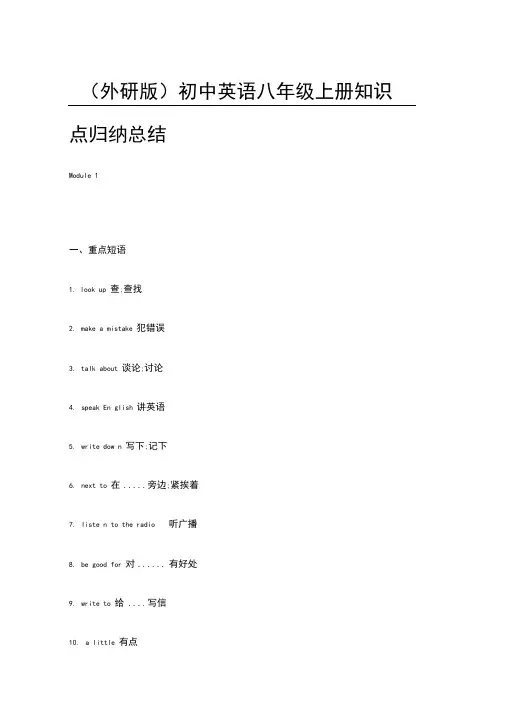
(外研版)初中英语八年级上册知识点归纳总结Module 1一、重点短语1.look up 查;查找2.make a mistake 犯错误3.talk about 谈论;讨论4.speak En glish 讲英语5.write dow n 写下;记下6.next to 在..... 旁边;紧挨着7.liste n to the radio 听广播8.be good for 对...... 有好处9.write to 给 .... 写信10. a little 有点12. talk to 跟……交谈11.agree with sb. 同意某人13.send sth. to sb. 把某物(发)送给某人14.ask for 请求15.watch films 看电影16.be from 来自17.smile at 冲 .... 微笑18.go to bed 去睡觉19.get up 起床20.thi nk about 考虑21.make frie nds with sb. 与某人交朋友22.take sb. around sp. 带领某人参观某地23. a few 几个;一些24.i nvite sb. to 邀请某人到....25.be good at 擅长26.for example 例如、重点句型1.advise sb to do sth 建议某人做某事2.be afraid to... 害怕做.....3.be good for... 对...... 有好处的4.be (a) great way(s) to do sth 做......... 的(一种)好方法5.It is n atural to do sth. 做某事是合乎常情的。
三、重点语法1.Why not...? = Why don ' t + you (we / they...)...?意为“为什么不……呢?”,后接动词原形。
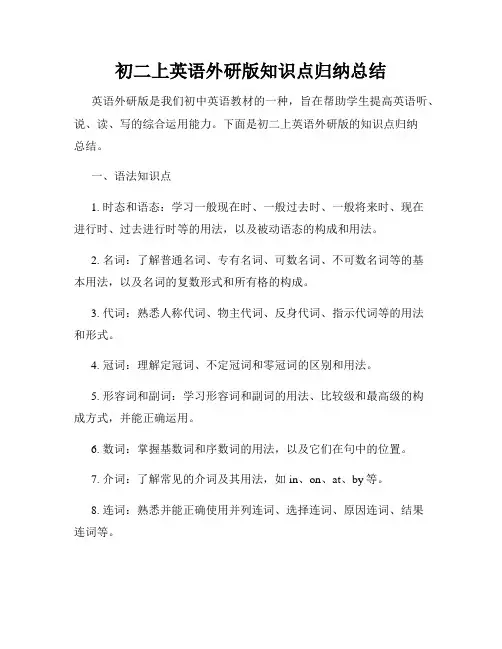
初二上英语外研版知识点归纳总结英语外研版是我们初中英语教材的一种,旨在帮助学生提高英语听、说、读、写的综合运用能力。
下面是初二上英语外研版的知识点归纳总结。
一、语法知识点1. 时态和语态:学习一般现在时、一般过去时、一般将来时、现在进行时、过去进行时等的用法,以及被动语态的构成和用法。
2. 名词:了解普通名词、专有名词、可数名词、不可数名词等的基本用法,以及名词的复数形式和所有格的构成。
3. 代词:熟悉人称代词、物主代词、反身代词、指示代词等的用法和形式。
4. 冠词:理解定冠词、不定冠词和零冠词的区别和用法。
5. 形容词和副词:学习形容词和副词的用法、比较级和最高级的构成方式,并能正确运用。
6. 数词:掌握基数词和序数词的用法,以及它们在句中的位置。
7. 介词:了解常见的介词及其用法,如in、on、at、by等。
8. 连词:熟悉并能正确使用并列连词、选择连词、原因连词、结果连词等。
9. 从句:了解主从复合句的构成和用法,包括宾语从句和定语从句等。
二、词汇知识点1. 日常生活词汇:掌握与学生日常生活密切相关的词汇,如身体部位、学科、家庭成员等。
2. 动词短语:学习常用的动词短语,如get up、go on holiday、take care等。
3. 学科词汇:了解和掌握与英语学科相关的词汇,如book、notebook、dictionary等。
4. 食物词汇:熟悉和运用与食物相关的词汇,如fruit、vegetable、meat等。
5. 动物词汇:学习各种动物的名称,如elephant、panda、tiger等。
三、阅读技巧1. 短文阅读:熟悉短文的结构,能快速获取信息和理解文章的主旨。
2. 阅读策略:掌握一些有效的阅读理解策略,如扫读、略读、细读等。
3. 理解词义:通过上下文来推断词义,提高词汇理解和运用能力。
四、听力技巧1. 日常交际:提高听懂常用的日常交际语言,如问候、道歉、提问、回答等。
2. 短对话和长对话:理解并提取对话中的关键信息,回答问题或完成任务。

八年级外研版英语上册语法知识点总结与归纳一、时态1. 一般现在时:表示经常性的动作或真理,主语为第三人称单数时,动词需加-s/-es。
2. 现在进行时:表示正在进行的动作,构成为:be + V-ing。
3. 一般过去时:表示过去发生的动作,动词需加-ed。
4. 过去进行时:表示过去某一时刻正在进行的动作,构成为:was/were + V-ing。
5. 现在完成时:表示过去发生的某个动作对现在造成的影响,构成为:have/has + V-ed。
6. 一般将来时:表示将要发生的动作,构成为:will + 动词原形。
7. 现在完成进行时:表示过去开始进行的动作一直持续到现在,并可能持续下去。
构成为:have/has been + V-ing。
二、被动语态1. 被动语态的构成为“be + 过去分词”,被动语态的主语通常是动作的承受者。
2. 被动语态的时态和语态都可以通过助动词“be”加以表示。
三、情态动词1. 情态动词共有9个:can, could, may, might, must, shall, should, will, would。
2. 情态动词用于表示说话人的态度、感情或是某种推测,通常搭配动词原形使用。
四、关系代词1. who/whom:指人,作主语用who,作宾语或补语用whom。
2. whose:指人或物,表示所有关系。
3. that:指人或物,作主语、宾语、表语、定语等,引导限制性定语从句。
4. which:指物,作主语、宾语、表语、定语等,引导非限制性定语从句。
五、虚拟语气1. 虚拟语气用于表示现在或将来的假设情况或与过去相反的情况。
2. “if”引导的虚拟条件句中,主句通常要使用情态动词;与过去相反的虚拟语气要使用“were”。
六、倒装句1. 完全倒装:将助动词或情态动词提到主语前,用于表示强调或出乎意料的语气。
2. 部分倒装:将助动词、情态动词、系动词等提到主语前,用于表示疑问、否定、祝愿等语气。
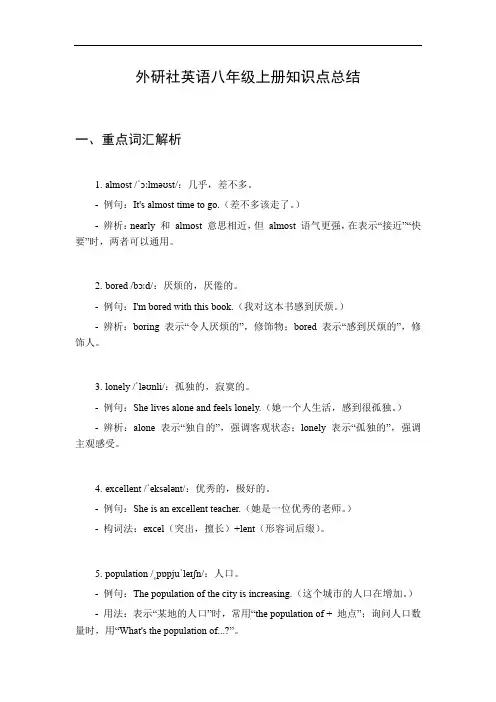
外研社英语八年级上册知识点总结一、重点词汇解析1.almost /ˈɔːlməʊst/:几乎,差不多。
-例句:It's almost time to go.(差不多该走了。
)-辨析:nearly 和almost 意思相近,但almost 语气更强,在表示“接近”“快要”时,两者可以通用。
2.bored /bɔːd/:厌烦的,厌倦的。
-例句:I'm bored with this book.(我对这本书感到厌烦。
)-辨析:boring 表示“令人厌烦的”,修饰物;bored 表示“感到厌烦的”,修饰人。
3.lonely /ˈləʊnli/:孤独的,寂寞的。
-例句:She lives alone and feels lonely.(她一个人生活,感到很孤独。
)-辨析:alone 表示“独自的”,强调客观状态;lonely 表示“孤独的”,强调主观感受。
4.excellent /ˈeksələnt/:优秀的,极好的。
-例句:She is an excellent teacher.(她是一位优秀的老师。
)-构词法:excel(突出,擅长)+lent(形容词后缀)。
5.population /ˌpɒpjuˈleɪʃn/:人口。
-例句:The population of the city is increasing.(这个城市的人口在增加。
)-用法:表示“某地的人口”时,常用“the population of + 地点”;询问人口数量时,用“What's the population of...?”。
二、重点短语1.quite a few:相当多,不少。
-例句:There are quite a few people in the park.(公园里有相当多的人。
)2.of course:当然,自然。
-例句:—Can I borrow your pen? —Of course.(—我能借你的笔吗?—当然可以。
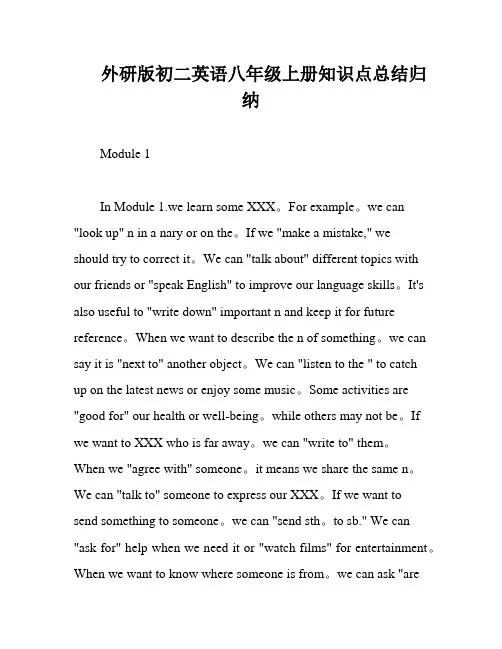
外研版初二英语八年级上册知识点总结归纳Module 1In Module 1.we learn some XXX。
For example。
we can "look up" n in a nary or on the。
If we "make a mistake," we should try to correct it。
We can "talk about" different topics with our friends or "speak English" to improve our language skills。
It's also useful to "write down" important n and keep it for future reference。
When we want to describe the n of something。
we can say it is "next to" another object。
We can "listen to the " to catchup on the latest news or enjoy some music。
Some activities are "good for" our health or well-being。
while others may not be。
If we want to XXX who is far away。
we can "write to" them。
When we "agree with" someone。
it means we share the same n。
We can "talk to" someone to express our XXX。

最新外研版英语八年级上册知识点总结
(精华版)
1. 语法知识点
- 时态:包括一般现在时、一般过去时、一般将来时等;
- 基本句型:包括陈述句、疑问句、否定句等;
- 名词:包括可数名词、不可数名词、复数形式等;
- 代词:包括人称代词、物主代词、反身代词等;
- 形容词:包括形容词的比较级和最高级等;
- 副词:包括副词的用法和位置等;
- 连词:包括并列连词、选择连词、从属连词等;
- 介词:包括基本介词和常用介词短语等;
- 动词:包括动词的不同形式、时态和语态等;
- 句子结构:包括主谓结构、主语从句、宾语从句等;
- 非谓语动词:包括动词不定式、动名词和分词等;
2. 词汇知识点
- 单词拼写:包括常见的单词拼写错误;
- 同义词:包括一些常见的同义词辨析;
- 常用短语:包括日常交际中常用的短语;
- 常用惯用语:包括一些惯用语的正确使用;
3. 阅读技巧
- 阅读理解:包括快速阅读和细节理解;
- 阅读速度:包括提高阅读速度和理解能力的方法;
- 阅读技巧:包括推测词义、寻找关键词等技巧;
4. 写作技巧
- 书信写作:包括格式、语言表达和常用句型等;
- 日记写作:包括表达个人感受和经历的方法;
- 作文写作:包括如何组织思路和提高写作水平的方法;
以上是最新外研版英语八年级上册的知识点总结,希望对你的研究有所帮助。

八年级上册英语外研版知识点一、重点短语1. how far 距离多远2. take the bus 乘公共汽车3. get to school 到校4. spend time 花时间5. go to the zoo 去动物园6. the more,the better 越多越好7. come true 实现8. have a good time 玩得开心9. look like 看起来像10. be ready 准备好了11. would like to do sth 想要做某事12. as a result 结果13. too…to 太……而不能14. on the one hand 在一方面15. be/get ready for 对……做好准备16. in the middle of 在……中间17. make/let sb do sth 让某人做某事18. on the weekend 在周末19. be able to 能够20. be afraid of 害怕21. have a good/bad day 过得开心/糟糕22. be careful 当心,小心23. be covered with 被……覆盖24. be famous for 因……而著名25. be full of 充满……的26. feel/seem/look+adj 看起来……27. in the sky/on the ground 在天上/在地上28. in the future 在将来29. in the sun 在阳光下30. be sure to do sth 确定做某事31. of course 当然了32. on fire 着火33. be late for迟到34. on time准时35. go shopping去购物36. be different from与……不同37. be similar to与……相似38. have a picnic野炊39. much too太……40. instead代替;反而,却41. none一点儿也没有,毫无42. all day整天,一整天,一整天;整日,终日。


外研八年级上知识总结一、重要短语1. more and more 越来越多2. in the future 在未来3. do shopping 购物4. at the weekend 在周末5. get up 起床6. do homework 做作业7. go to bed 上床睡觉8. go to the cinema 去看电影9. on the/a weekend 在周末10. in a week 在一周内二、重点句型1. It will be + 形容词 + in + 时间段 + 表示未来某个时间点之前会发生的情况。
2. What will you do + 时间点?你将在什么时候做什么?3. How will you go to + 地点?你将如何去某地?4. Let’s + 动词原形 + 表示建议或提议。
5. What are you doing + 时间点?你正在做什么?6. When are you going + 动词不定式?你打算什么时候做某事?7. How long will it take you to do sth?做某事需要多长时间?8. It takes sb some time to do sth某人花费一些时间做某事。
9. I’m sorry to hear that听到这个消息我很难过。
10. I hope to do sth我希望做某事。
三、语法重点1. 将来时态的构成和用法。
2. 宾语从句的用法,包括连接词和语序。
3. 情态动词的用法,包括can、may、must等。
4. 现在完成时的用法,包括have/has been和have/has done的区别。
5. 形容词的比较级和最高级的用法。
6. 反身代词的用法,包括强调主语和表示强调等。
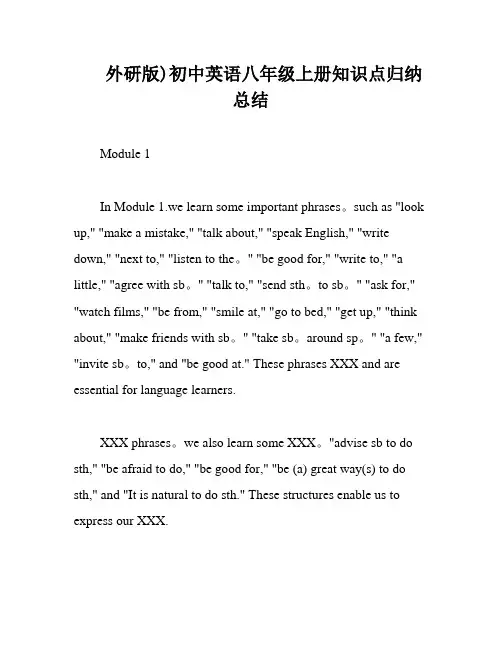
外研版)初中英语八年级上册知识点归纳总结Module 1In Module 1.we learn some important phrases。
such as "look up," "make a mistake," "talk about," "speak English," "write down," "next to," "listen to the。
" "be good for," "write to," "a little," "agree with sb。
" "talk to," "send sth。
to sb。
" "ask for," "watch films," "be from," "smile at," "go to bed," "get up," "think about," "make friends with sb。
" "take sb。
around sp。
" "a few," "invite sb。
to," and "be good at." These phrases XXX and are essential for language learners.XXX phrases。
we also learn some XXX。
"advise sb to do sth," "be afraid to do," "be good for," "be (a) great way(s) to do sth," and "It is natural to do sth." These structures enable us to express our XXX.Finally。

英语初二上册重点知识点讲解Module 1 How to learn English1.pair n. (相关的)两个人,一对,一双,一副a pair of socks a pair of gloves two pairs of trousers一双袜子一副手套两条裤子e.g.A pair of teenage boys are watching a football game.两个青少年正在看足球赛。
2.correct(1)v. 改正,纠正e.g.The teacher returned to her room to correct exercise books.老师回到房间去改练习本。
Correct the spelling.纠正拼写。
(2)adj.正确的;恰当的e.g.correct pronunciation 正确发音Do you have the correct time?你的表走得准吗?3.advice(1)n.意思是“意见,建议”,为不可数名词,可用some,much,a piece of,pieces of等修饰,不能说an advice或many/a few advices。
(2)表示“有关……的建议”时,用介词on,接名词、代词或由疑问词引导的不定式。
e.g.Let’s ask for his advice on what to do next.我们去征求一下他的意见下一步该怎么办。
常见搭配:take/follow one’s advice接受某人的建议ask for advice 征求意见accept/refuse one’s advice接受(拒绝)某人的建议offer advice to sb. 向某人提供建议拓展:advise vt.建议常见搭配:advise sb. to do sth.advise that sb. (should) do sth.e.g.My teacher advises me to leave now.老师建议我现在就离开。
(外研版)初中英语八年级上册知识点归纳总结Module 1一、重点短语1. look up 查;查找2. make a mistake 犯错误3. talk about 谈论;讨论4. speak English 讲英语5. write down 写下;记下6. next to 在……旁边;紧挨着7. listen to the radio 听广播8. be good for 对……有好处9. write to 给……写信10. a little 有点11. agree with sb. 同意某人12. talk to 跟……交谈13. send sth. to sb. 把某物(发)送给某人14. ask for 请求15. watch films 看电影16. be from 来自17. smile at 冲……微笑18. go to bed 去睡觉19. get up 起床20. think about 考虑21. make friends with sb. 与某人交朋友22. take sb. around sp. 带领某人参观某地23. a few 几个;一些24. invite sb. to 邀请某人到……25. be good at 擅长26. for example 例如二、重点句型1. advise sb to do sth 建议某人做某事2. be afraid to... 害怕做……3. be good for... 对……有好处的4. be (a) great way(s) to do sth 做……的(一种)好方法5. It is natural to do sth. 做某事是合乎常情的。
三、重点语法1. Why not...? = Why don’t + you (we / they...)...?意为“为什么不……呢?”,后接动词原形。
eg:Why not / Why don’t we help the old cleantheir rooms this afternoon?今天下午为什么不去帮助老人打扫房间呢?2. What / How about...? 意为“……怎么样?”,其中about 是介词,后接名词或动词-ing 形式。
以下是八年级上册外研社版英语知识点归纳:1. 重点短语:(1) how often 多久一次(2) as for 至于(3) on weekends 在周末(4) most of the time 大部分时间(5) practice doing sth. 练习做某事(6) spend time doing sth. 花时间做某事(7) go to the movies 看电影(8) look after 照顾(9) stay healthy 保持健康(10) get a headache 头疼2. 重点句型:(1) What do you usually do on weekends? 你通常在周末做什么?(2) How often do you exercise? 你多久锻炼一次?(3) I usually read books at home on weekends. 我通常在周末在家看书。
(4) My eating habits are different from his. 我的饮食习惯和他不同。
3. 语法知识:(1) 现在进行时表示正在进行的动作或存在的状态,常与now,listen,look等词连用。
结构是be动词+动词的ing形式。
如:I am doing my homework now. 我正在写作业。
(2) 现在进行时的一般疑问句和否定句的变化:把be动词提前,变成一般疑问句;在be动词后加not,变成否定句。
如:Are you playing football? 你们在踢足球吗?-No,we are not. 不,我们没有。
(3) 频度副词:表示动作发生的频率,如:always,often,sometimes,never等。
如:How often do youwatch TV? 你多久看一次电视?。
外研社英语8年级上册知识点归纳外研社英语8年级上册知识点归纳第一部分:语法1. 一般现在时一般现在时表示经常性的或习惯性的动作,或者表示客观事实等。
例如:I usually get up at six in the morning.Water boils at hundred degrees Celsius.2. 一般过去时一般过去时表示已经发生了的动作或状态。
例如:I met him yesterday.He didn’t go to the party last night.3. 现在进行时现在进行时表示正在进行的动作。
例如:I am watching TV right now.They are having dinner together.4. 一般将来时一般将来时表示将来时发生的事。
例如:I will stay at home tomorrow.She won’t come to the meeting.5. 情态动词的用法情态动词包括 can、may、must、shall、should、will等。
它们用来表示一种语气、情态或者家庭中发生的事情。
例如:We should study hard for the exam.You must finish your homework before dinner.第二部分:词汇1. 动物动物类词汇,包括常见动物、动物的身体部位、动物的饲养和保护等。
例如:cat、dog、panda、lion、neck、tail、pet、zoo、wildlife等。
2. 食物食物类词汇,包括早餐、午餐、晚餐、小吃、饮品等。
例如:toast、milk、coffee、hamburger、pizza、salad等。
3. 旅行用语旅行用语类词汇,包括交通工具、旅行目的地、旅行中使用的语言等。
例如:by plane、train、bus、boat、beach、museum、souvenir等。
Module1 How to learn EnglishUnit1 Let’s try to speak English as much as possible.1.Welcome back!Welcome back to school!Welcome to China/our school/my home town!Welcome home!You’re welcome.give sb. a cold/warm welcome注意welcome的词性v. adj n.2.talk with/to sb. about sth.have a talk/conversation with sb.3. ask for some advicea piece of advice注意advice是不可数名词,不能说these advicegive sb. advice给某人建议take/follow one’s advice听从某人的建议4. speak English in classspeak English as much as possibleread books as many as you canas…as possible = as…as one can/could5. write down our mistakes in our notebookswrite it/them down (代词宾格只能放中间)类似结构还有pick up, take off, put on, turn on, turn off, turn down, turn up6. forget/ remember to do sth.记得、忘记要做某事(还没做)forget/remember doing sth. 记得、忘记做过某事(已经做了)eg: Don’t forget to bring your photos here when you come.I remember seeing him somewhere in Jiaxing. 我记得在嘉兴的某个地方见过他。
八年级上册外研知识点八年级上册的外研知识点主要包括英语中的基础语法、单词、词组和句型等,这些知识点是英语学习的基础,掌握了这些知识点,可以帮助学生更好地理解和掌握英语,为后面的学习打下坚实的基础。
一、基础语法1. 现在进行时现在进行时用于表示正在进行的动作或状态,其构成为“主语+be动词(am/is/are)+动词-ing”。
例如:I am studying English now.2. 一般现在时一般现在时用于表示经常性的动作、客观事实、习惯或动态,其构成为“主语+动词原形+其他(时间状语、否定词等)”。
例如:He usually gets up at six in the morning.3. 一般过去时一般过去时用于表示过去发生的动作或状态,其构成为“主语+动词过去式+其他(时间状语、否定词等)”。
例如:I watched TV last night.4. 情态动词情态动词用于表示说话人的态度、意愿、能力、推测等,常见的情态动词有can、may、will、shall、should、would、must等。
例如:I think we should help others.二、单词和词组1. 动词短语动词短语由一个主动词和一个或几个助动词组成,表示某种动作或状态。
例如:be interested in、look forward to、take part in等。
2. 副词副词用于修饰动词、形容词或其他副词,表示时间、地点、方式、程度等含义。
例如:always、often、never等。
3. 名词性词组名词性词组由名词和一个或几个修饰它的词组成,可以作为名词的补充说明。
例如:the day before yesterday、a lot of、a kind of 等。
三、句型1. 一般疑问句一般疑问句用于询问信息或确认某种情况是否属实,其构成为“助动词+主语+动词原形+其他(时间状语等)?”。
例如:Do you like English?2. 特殊疑问句特殊疑问句用于询问特定的信息,其构成为“疑问词+动词+主语+其他(时间状语等)?”。
1. 介词:介词用于连接名词或代词与其前面的词,并表达它们之间的关系,常见的介词有in, on, at, under, above, below等。
2. 冠词:冠词用于限定名词的范围,包括定冠词the和不定冠词a/an。
3.形容词和副词的比较级和最高级:形容词和副词的比较级用于表示两者之间的比较,最高级则用于表示三者或三者以上之间的比较。
4. 不规则动词:有些动词的过去式和过去分词形式不规则,常见的不规则动词包括go-went-gone, eat-ate-eaten, see-saw-seen等。
5.句子的基本结构:英语句子的基本结构是主语+谓语+宾语,其中谓语可以是及物动词或不及物动词。
6. 物主代词:物主代词用于表示所有关系,包括我的mine,你的yours,他的his等。
7.时态:英语中有三大时态,一般现在时,一般过去时和一般将来时,表示动作的发生时间。
8.句型的变换:英语句子的结构可以根据需要进行变换,包括肯定句、否定句、疑问句以及选择疑问句等。
9.数词和数量表达方式:英语中有基数词和序数词,分别用于表示数量和顺序。
10.比较级和最高级的句型:比较级和最高级可以用于构成表示比较的句子,包括as…as, not as…as, the+比较级…the…等句型。
11.数词和时态的表达方式:英语中可以用数词和时态来表达一些动作发生的频率,如once a week, twice a month等。
12.情态动词:情态动词用于表示说话人的态度、意愿、能力、推测等,常见的情态动词包括can, could, may, might, must, should等。
13.虚拟语气:虚拟语气用于表示与事实相反或不可能实现的情况,包括与过去事实相反的虚拟语气以及祝愿,建议等虚拟语气。
14.被动语态:被动语态用于表达动作的承受者,句子的主语成为动作的接受者,谓语动词由"be"加上动词的过去分词构成。
教研版八年级英语上册单词、短语、用法集萃Module 1 How to learn English一、必记单词1、Grammar n. 语法2、pronunciation n. 发音3、practise v. 练习4、advice n. 意见;建议5、possible adj. 可能的6、aloud adv. 大声地;出声地7、improve v. 改进;改善8、suggest v. 建议;提议9、vocabulary n. 词汇;词汇量10、spelling n. 拼写12、understand v. 理解;明白13、should v. aux. 应该14、forget v. 忘;忘记15、agree v. 赞同16、quickly adv. 快地;迅速地二、短语归纳1. look up查;查找2. make a mistake犯错误3. talk about谈论;讨论4. speak English讲英语5. write down写下;记下6. next to在……旁边;紧挨着7. listen to the radio听广播8. be good for对……有好处9. write to给……写信10. a little有点 with sb.同意某人12. talk to跟……交谈13. send sth to sb.把……(发)送给某人14. ask for请求(给予)15. watch films看电影16. be/come from来自17. smile at冲……微笑18. go to bed去睡觉19. get up起床20. think about考虑21. make friends with sb.与某人交朋友22. take sb. around带领某人参观……23. a few几个;一些24. invite sb. to邀请某人到……25. be good at擅长26. for example例如三、经典句型1. We should always speak English in class. 在课上我们应该总是讲英语。
2. Let's try to speak English as much aspossible.让我们尽可能多地讲英语。
3. Why not write down the mistakes in ournotebooks?为什么不在我们的笔记本上记下错误呢?4. It's a good idea to spell and pronouncenew words aloud every day.每天大声拼读生词是一个好主意。
5. How about listening to the radio?听广播怎么样?四、用法集萃1. how+ to do sth.如何做某事2. try- to do sth.尽力去做某事3. practised doing sth.练习做某事4. a way/ways+ to do sth.做某事的方法5. forgets to do sth.忘记去做某事6. How about+ doing sth.?做某事怎么样?7. needy to do sth.需要做某事8. let sb. +do sth.让某人做某事9. enjoy+doing sth.喜欢做某事10. be afraid+ to do sth.不敢做某事11. should+do sth.应该做某事12. stop+to do sth.停下来去做某事13. Something+形容词……的事情十形容词/副词原级+as possible 尽可能……sb.+to do sth. 建议某人做某事+ be+形容词+(for sb.)十to do sth.(对某人来说)做某事是……的。
's a good idea+ to do sth.做某事是一个好主意。
18. Why not十do sth.?为什么不做某事呢?don't we/you+do sth.?我们/你(们)为什么不做某事呢?20. suggest (that) sb,+(should) do sth.建议某人(应该)做某事Module2 Myhome town and my country一、必记单词1、hill n.小山;小丘2、wide adj.宽的;宽阔的3、pretty adv.相当地;非常;很4、especially adv.尤其5、island n.岛;岛屿6、low adj.矮的;低的7、countryside n.农村地区;乡下8、population n.(某一地区的)人口9、million num.百万10、than prep.比11、university n.大学12、area n.地区;区域13、mountain n.山;山岳14、north n.北;北方;adj.在北方的;朝北的15、south n.南;南方;adj.在南方的;朝南的16、west n.西;西方; ad j.在西方的;朝西的二、短语归纳1. pretty good相当好;很好2. in fact事实上3. in the 1980s在20世纪80年代4. one day有一天5. come from来自6. lots of许多7. be famous for以……而闻名8. part of ……的一部分9. more than超过;多于10. on the coast在海岸边11. in the east/south/west/north of…在……的东/南/西/北部三、经典句型1 .It's taller than many other buildings.它比许多其他建筑物都高2. Some day it will become as busy as HongKong,I'm sure.我相信终有一天它会变得和香港一样繁华。
3. What's the population of Shenzhen?深Oil的人口是多少?4. It is a newer city than Hong Kong.它是一个比香港更新的城市。
5. Cambridge is in the east of England.剑桥在英格兰东部。
四、用法集萃1. What's the population of....…的人口是多少?2. as+形容词/副词原级+as和·····一样……3. would like+ to do sth.想要做某事4. remember+to do sth.记着去做某事5. like+ to do sth.喜欢做某事6.... + be+形容词比较级十than.…比……更加……Module 3 Sports一、必记单词1、baseball,n.棒球2、volleyball n.排球3、boring adj.烦人的;无聊的4、exciting adj.令人激动的,使人兴奋的。
5、relaxing adj.令人愉悦的;使人放松的6、matter n.问题;麻烦7、enjoyable adj.令人愉快的;有乐趣的8、stadium n.体育场9、mind v. 介意; 讨厌;反对10、careless adj. 粗心的;疏忽的11、already adv.已经;早已12、hurt v.(使)疼痛;(使)受伤13、Olympics n.奥林匹克运动会14、Miss v.未击中;未达到15、train v.(体育)训练;操练16、practice n.练习17、usual adj.通常的;平常的18、warm v.使暖和;使温暖二、短语归纳1. sit down坐下2. stay at home待在家里3. bad luck坏运气4. watch TV看电视5. lose matches输掉比赛6. next time下一次7. be good at擅长8. play against对抗9. warm up热身;做准备活动10. be late for迟到11. cheer on用欢呼声激励;为……加油12. keep fit保持健康13. get lost迷路14. a minute ago一分钟之前15. plenty of许多16. be ready for为……做好准备17. at weekends在周末18. in the countryside在乡村三、经典句型1 .Nothing is more exciting than playing tennis.没有什么比打网球更令人兴奋。
2. What's the matter with you, Tony?你怎么了,托尼?3.…that's because it was cheaper than buying tickets for all the games.……那是因为对所有比赛来说,通过电视看(比赛)比买票看(比赛)更便宜。
4. Which sport do you like better,swimming or running?游泳和跑步你更喜欢哪项运动?5. We are training harder than usual because the other team beat us last year.我们比平常更加努力地训练,因为另一支球队去年打败过我们。
四、用法集萃1. look+形容词看起来……2. play+球类运动名词(单数) 打/踢……球3, enjoy doing sth. 喜欢做某事4. liked to do/doing sth.喜欢做某事5. beat sb. /team 打败某人/某队6. have a chance of+doing sth.有做某事的机会7. stop doing sth. 停止做某事8. decide to do sth.决定做某事9. go+ doing 去从事某项运动或活动10. see sb. doing sth.看见某人正在做某事11. 一段时间+ago ……之前12. What's the matter with sb. / sth.?某人/某物怎么了?13. the+比较级,the+比较级越……,就越……Module 4 Planes, ships and trains一、必记单词1、road n.路;(尤指)公路2、except prep.除……之外3、journey n.旅行;旅程4、outside prep.在……之外5、however adv.然而;但是6、accident n.交通事故;意外事件7、crowded adj.拥挤的;人数过多的8、book v.预订9、choice n.选择10、cost v.价钱为;花费;n.价钱;成本;代价二、短语归纳1. by bike骑自行车2. far from远离3. road accident公路上的交通事故4. as well也5. get crowded变得拥挤6. have a great trip旅途愉快7. take a plane乘飞机三、经典句型1. What happened?发生什么了?2. Then what about going by bike?那么骑自行车去怎么样?3. He lives the farthest from school,so hetakes the underground.他住的离学校最远,因此他坐地铁去。